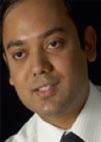
Saikat Guha
BBN Technologies |
Ultimate Capacity Limits for Classical Communications on Bosonic Channels
November 19, 2008 - 9:20-9:45am
RLE Conference Center 36-428
Abstract
In order to ascertain the ultimate rates for reliable communication of classical data using electromagnetic waves, a full quantum-mechanical analysis is necessary to properly account for the bosonic nature of these waves. This talk will present an overview of our recent work aimed at evaluating capacities of bosonic communication channels both in point-to-point and multiple-user settings. This is a line of research that began with the capacity derivation for the input photon-number constrained lossless Bosonic channel by Yuen and Ozawa in 1993. Recent work has established achievable capacity-regions for bosonic multiple-access channels, and ultimate-capacity theorems for bosonic single-user, broadcast, and wiretap channels, under the presumption of two minimum output entropy conjectures. Despite considerable accumulated evidence that supports the validity of these conjectures, they have yet to be formally proven. Interestingly, we have shown these minimum output entropy conjectures to be simple consequences of an Entropy Photon-Number Inequality (EPnI), which is a conjectured quantum-mechanical analog of the Entropy Power Inequality (EPI) form classical information theory -- a theorem that has been widely used in a variety of capacity proofs for classical Gaussian-noise channels.
Bio
Saikat Guha currently works for BBN Technologies Corporation in Cambridge, MA. He received his B.Tech. degree in Electrical Engineering from the Indian Institute of Technology (IIT) Kanpur in May 2002, and he received his S.M. in EECS from MIT in February 2004 with a thesis on capacities of free-space quantum optical communication channels. Saikat represented India as a part of the first Indian team of five students at the 29th International Physics Olympiad at Reykjavik, in July 1998 where he received the European Physical Society award for the experimental component. He carried out his doctoral research under the supervision of Prof. Jeffrey H. Shapiro at the Optical and Quantum Communications Group of Research Laboratory of Electronics (RLE), MIT. He earned his Ph.D. in June 2008 from the department of EECS, MIT. His current research interests include quantum information and communication theory, quantum optical sensors, multiple-user bosonic communications, quantum adiabatic computation, and QKD networks.
|



